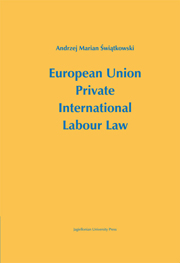Book contents
- Frontmatter
- Contents
- Introductory Comments
- Part I Preliminary Part
- Part II Conflicts of law of individual labour law in the light of the Rome Convention of June 19, 1980 and Regulation of the European Parliament and the Council of the European Communities No. 593/2008 of June 17, 2008 on the law applicable to contractual obligations (“Rome I”)
- Part III Conflict of law issues in individual labour law in light of the Regulation (EC) No. 864/2007 of the European Parliament and the Council of the EU (July 11, 2007), concerning law applicable to Non-Contractual Obligations (“Rome II”)
- Part IV Conflicts of law in collective labour law
- Part V Conflicts of law in social security – the coordination of national social security systems of EU Member States according to the regulation of the European Parliament and Council Regulation (EC) No. 883/2004 of April 29, 2004 on the coordination of social security systems
- Chapter 1 The function of European social security regulations
- Chapter 2 The scope and method of application of Regulation No. 883/2004
- Chapter 3 The Determinants of Coordinating Laws
- Part VI International procedural labour law of the European Union
- Selected bibliography
Chapter 2 - The scope and method of application of Regulation No. 883/2004
from Part V - Conflicts of law in social security – the coordination of national social security systems of EU Member States according to the regulation of the European Parliament and Council Regulation (EC) No. 883/2004 of April 29, 2004 on the coordination of social security systems
Published online by Cambridge University Press: 05 September 2014
- Frontmatter
- Contents
- Introductory Comments
- Part I Preliminary Part
- Part II Conflicts of law of individual labour law in the light of the Rome Convention of June 19, 1980 and Regulation of the European Parliament and the Council of the European Communities No. 593/2008 of June 17, 2008 on the law applicable to contractual obligations (“Rome I”)
- Part III Conflict of law issues in individual labour law in light of the Regulation (EC) No. 864/2007 of the European Parliament and the Council of the EU (July 11, 2007), concerning law applicable to Non-Contractual Obligations (“Rome II”)
- Part IV Conflicts of law in collective labour law
- Part V Conflicts of law in social security – the coordination of national social security systems of EU Member States according to the regulation of the European Parliament and Council Regulation (EC) No. 883/2004 of April 29, 2004 on the coordination of social security systems
- Chapter 1 The function of European social security regulations
- Chapter 2 The scope and method of application of Regulation No. 883/2004
- Chapter 3 The Determinants of Coordinating Laws
- Part VI International procedural labour law of the European Union
- Selected bibliography
Summary
Persons covered
Regulation No. 883/2004 applies to nationals of Member States, stateless persons and refugees residing in the Member States who are or have been subject to social security laws of one or more Member States. It also applies to family members of such persons (Article 2, paragraph 1). In addition, the aforementioned Regulation applies to survivors of deceased to the persons who are subject to social security legislation of one, two or more EU Member States (citizens, stateless persons or refugees) (Article 2, paragraph 2). A necessary condition for the application of Regulation No. 883/2004 for these persons is to remain in their employment relationship in a Member State, in business activity, trade or service or reside in the territory of a Member State. The last requirement shall be deemed satisfied if the rules of the social security legislation of a Member State, where the insured person lived and whereby this period of residence is amalgamated by the state into the period of social security cover. Since the coordinating laws of national social security regulations make social security benefits dependent upon the condition of employment (or self-employment) or residence in a Member State, Title I of Regulation No. 883/2004, therefore contains the definitions of “paid work,” “self-employment,” “insured,” “family member,” “period of insurance,” and “usual residence.” Autonomous definitions of the Regulation in the analysis are not exhaustive.
- Type
- Chapter
- Information
- European Union Private International Labour Law , pp. 211 - 219Publisher: Jagiellonian University PressPrint publication year: 2012



